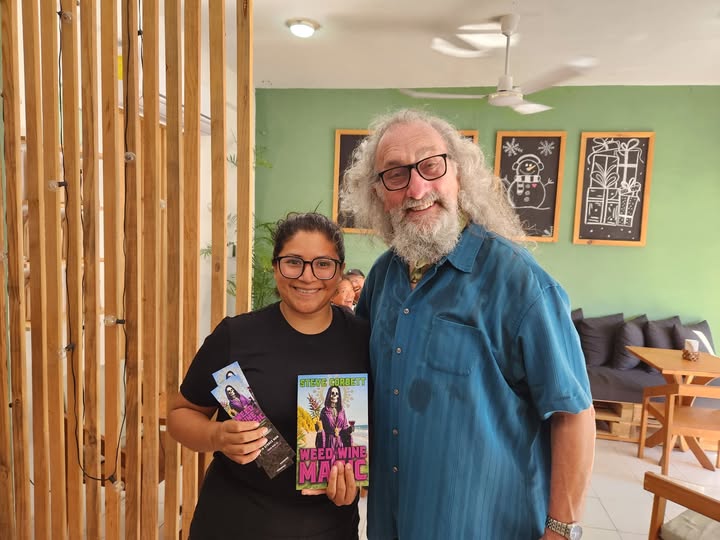Wet sweat stains my shirt. My hair is long, gray, unwieldy. My goatee resembles an iguana’s dewlap “beard.” I’m a wide-eyed tropical outlaw on a mission.
“Hola, ¿habla inglés?” I say to the young woman working behind the counter at Bambu Café Isla.
She does.
Unlike most English-only Americans, countless people who live in Isla Mujeres, the Island of Women off the Mexican Yucatán Peninsula, speak English as well as other languages including indigenous dialects spoken by ancient Maya ethnic groups in the Mesoamerican civilization that once ruled the island.
I ask about the little lending library the café maintains for customers who want to drop off a book for customers looking for something to read. She points to a few small shelves by the door neatly packed with books.
“I have a book for you,” I say.
Holding up a copy of my latest novel Weed Wine Magic I politely explain that I wrote the novel, some of which is set in Isla Mujeres and tells the story of Maya moon goddess Ixchel who lives eternally on the island. Turning the book around I show her the back cover author’s photo my wife/editor/manager Stephanie took of me standing last May in front of Ixchel’s temple ruin overlooking the Caribbean Sea on the south side of the island.
“That’s me,” I say, holding the book beside my face.
Something freakily important is happening. At 6-foot-220-pounds I’m un gran gabacho (Mexican slang for big white American to be used either disparagingly or with affection) rolling in off the street waving over my head a book bearing a bright purple picture of La Santa Muerte on the front cover and my own photo on the back. The Mexican death saint is holding a red glass of cannabis-infused weed wine in one hand and a plant full of marijuana buds in the other.
In the photo I’m wearing shades. My hair looks like a jungle snake dance. My lavender linen shirt is sweat-stained. Would you buy a used Chevy off this man? I ask if it’s OK to sign the bright copy and offer the tome as a present from my boundless spirit.
“Yes,” she says softly. “Of course.”
Thankfully she sees me as a different kind of loco. I’m an out-of-the-ordinary tourist with something extraordinary to give. She tells me she will place my unique book up front where people can see the paperback leading the pack as soon as they walk inside. No matter what other writer living or dead inhabits this little lending library, Hemingway famous or otherwise, I’ll be first, greeting patrons who might be interested in taking an unexpected trip to the centers of their minds.
“Thank you,” I say.
“No, no,” she says, truly grateful. “Thank you.”
I had earlier stopped by Cafe Mogagua a few narrow side streets away and made the same pitch to the manager. He seemed honored with my gift and thanked me several times for the signed copy he promised to display in his coffee shop’s lending library. Isla Mujeres lacks a bookstore, but some small businesses, including hotels, offer books for their guests’ reading pleasure.
Sealing the sacred human bond of knowledge is like breathing bright golden moonbeams.
Ixchel understands.
People who read and appreciate novels also understand. For them no explanation is needed. People who don’t read and appreciate novels will never understand. For them no explanation is possible.
My friends at Bambu Café Isla and Cafe Mogagua grasp the precious secrets written words teach.
I wonder who’s reading me now.
